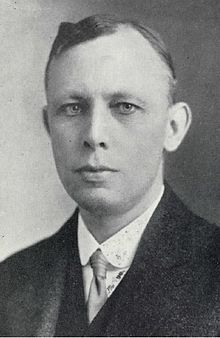Kirsopp Lake
| Kirsopp Lake | |
|---|---|
 |
|
| Born |
April 7, 1872 Southampton, England |
| Died | November 10, 1946 (aged 74) South Pasadena, California |
| Nationality | United Kingdom |
| Fields | New Testament, textual criticism |
| Institutions |
Leiden University Harvard University |
| Alma mater | Lincoln College, Oxford |
| Academic advisors |
F. C. Conybeare J. Rendel Harris |
| Notable students |
Adriaan de Buck Erwin R. Goodenough James Luther Adams |
| Notable awards | Burkitt Medal for Biblical Studies from the British Academy |
| Spouse | Helen Courthope Forman Silva Tipple New |
Kirsopp Lake (7 April 1872 – 10 November 1946) was a New Testament scholar and Winn Professor of Ecclesiastical History at Harvard Divinity School. He had an uncommon breadth of interests, publishing definitive monographs in New Testament textual criticism, Greek palaeography, theology, and archaeology. He is probably best known for the massive five-volume work The Beginnings of Christianity—an edition, translation, commentary, and study of the Acts of Apostles—that he conceived and edited with F. J. Foakes-Jackson.
Kirsopp Lake was born in Southampton, England, on 7 April 1872, the elder of two surviving children of George Anthony Kirsopp Lake, a physician, and Isabel Oke Clark. His father came from a family of Scottish origin and Kirsopp was the family name of the boy's paternal grandmother. He was educated at St Paul's School, London and then went up to Lincoln College, Oxford, matriculating in 1891. He attended as an Exhibitioner and was the Skinners' Company's Scholar in 1893, finally graduating (B.A., 1895) with a second class in theology. He also attended Cuddesdon Theological College in 1895. He originally had intended to read law and to pursue a career in politics. However, an overdose of exercise, too soon after influenza, affected his heart and he was told by doctors that law and politics were out of the question. According to his son, "he was delicate and the church seemed to give the opportunity for a living and for some influence over the society that interested him."
Following graduation Lake was ordained a deacon in the Church of England (1895) and served as curate in Lumley, Durham, where he preached to the pitmen and miners in that North Country mining district. "I do not believe that theology entered very much into his sermons," recalls his son, "but he did conduct The Mikado and he still tells the story of the brawny pitman who, having rescued him from the attack of a drunken navvy from a neighbouring village and listened to his comments on the situation, said 'Mon, he's no much to look at, but has he no a bonny tongue?!'" After a years service he was ordained priest (1896), however he had further issues with his heart and decided to return to Oxford, to the less rigorous climate of the South in order to improve his health. He earned his M.A. in 1897 and from that year to 1904 he served as curate of St. Mary the Virgin, Oxford, a much more academic atmosphere. During these years, in order to supplement his income, he also took a job cataloging Greek manuscripts in the Bodleian Library. That activity aroused in him an interest in the Synoptic problem and matters of New Testament textual criticism, and saw the publication of his first book, the very useful handbook The Text of the New Testament (1900). Some sixty years later Stephen Neill describes the 6th ed. (1928) as "still the best short introduction to New Testament textual criticism that exists in any language." It was most likely the influence exerted over him by F. C. Conybeare, Fellow of University College, Oxford, which was the main factor in Lake's development. It was Conybeare who initiated Lake into the mysteries and problems of New Testament palaeography and textual criticism.
...
Wikipedia
